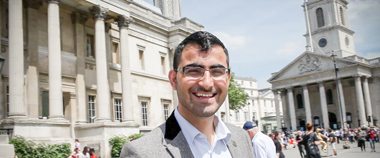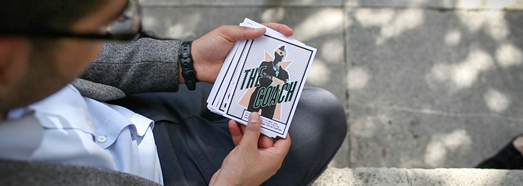Now a Refugee Week Young Ambassador, Gulwali Passarlay is originally from a small village in eastern Afghanistan. He fled when he was 12 because of the war and due to fears for his safety. His family had close connections with the Taliban through his uncle, a Taliban commander and part of its intelligence service, and in 2004, his family home was searched by Afghan militia and US military. There was a fight and four members of his family were killed: his father, an uncle, elder brother and grandfather – the uncle they were looking for escaped.


Gulwali, who was 10 at the time, was studying with one of his elder brothers in Jalalabad, staying with their maternal grandparents. After the attack, his mother, sisters and younger brothers, moved to Jalalabad. Gulwali and his brother (who was two years older) were in danger as the Northern Alliance threatened to kidnap them in order to get to his uncle.
“The Taliban tried to recruit me and my brother to take revenge on those who attacked his home. My mother was very worried for our safety and decided we had to get out of the country to safety. She had already lost one son and she didn’t want to lose another,” Gulwali said.
In 2006, his mother contacted someone who could get them out of the country. Neither Gulwali, his brother or mother knew they would be separated. Gulwali was taken by a man and his brother a woman smuggler.
Dangerous route to safety
They flew to Iran where Gulwali was handed over to another agent. He was moved from group to group, travelling over harsh terrain:
“From Iran the hardship began: travelling hidden in lorries, buses, cars, walking long distances and even riding a horse. It was especially hard at borders. I was scared and couldn’t trust anyone. The agents were heartless, sometimes there was no food for days and it was very cold. I knew I had to leave Afghanistan, but I was worried for my family,” he said.
It took a month to get to Turkey.
“In Turkey we were packed into trucks – there were just three trucks that met us for hundreds of people. We travelled that way for hours over mountains and then we were left,” he said.
“I couldn’t understand what was happening to me, but I knew I had to go on. I tried not looking like a child. I pretended to shave, but there was nothing to shave. We stayed in dirty, over-crowded rooms, sometimes they were underground. There were times I was kidnapped by agents – I was a commodity for them.
“I boarded a boat for Athens and was scared as I knew that boats like this sometimes sink. It was very crowded. It was only for 50 people, but we were over 100. We ran out of food and water – this was the only time I felt afraid of what could happen. We were treated like animals. Everything hurt.
“Water started to come in the boat, some people jumped out but I stayed on. Police came to arrest us. I didn’t want to die there, in the water. If I did, my body would be lost and my family would never know what happened to me or where I was.”
The police rescued them and gave them food and water, “at least we were safe. This is the most scared I ever was”.
Gulwali managed to get to Italy and eventually he met up with other Afghan asylum seekers and they made their way to France – it took months to get there – and then Calais. “I wanted to get to the UK because my uncle was there. But I would have gone anywhere safe that would let me stay.”
Arriving in the UK
I managed to get to the UK by hiding on a lorry that was transporting bananas: “luckily the refrigerator was off, otherwise I would have died.”
Gulwali was discovered when the lorry arrived at the factory and sent to prison for 24 hours. He was 13.
The police asked where he was from and his age. He was taken to an immigration removal centre in Dover, but because he was still a child, he wasn’t deported. Instead he was taken to a hotel, where he stayed for a few of days. He was given an immigration registration card and began to look for his uncle.
When social services interviewed him they didn’t believe his age because he came across as more mature and self-confident. They decided he was 16½ — though a doctor assessed him as being between 14 and 16. They didn’t accept his birthdate nor where he was from. However, he was asked if wanted to seek asylum and he said he did.
He was kept in a hostel for newly arrived asylum seekers until they could find him a reasonable place to live. He was there for three months. Because he was assessed as 16½, he was given a one year visa, with no right of appeal, meaning he would be sent back to Afghanistan when he was 17 or 18.
Because his age was disputed, college wouldn’t accept him because he said he was 13. School wouldn’t accept him because social services said he was nearly 17.
He found his uncle in Bolton, but the authorities wouldn’t allow him to stay with him. Instead he was put in a ‘bed space’ – a room that he shared with another asylum seeker: a man aged about 20.
Thanks to Starting Point, which helped newly arrived asylum-seeking children become ready for mainstream school, Gulwali was able to go to attend a UK school once his age dispute was resolved. The head teacher understood his case, believed his age and helped him get a school uniform and other things he needed.
“I was at this school for a year. I was in despair, no one believed my age, the Home Office threatened to send me back to Afghanistan. But in the end, I managed to prove my age. So, from being thought to be 18 by this time, they recognised I was only 14. As a result, I could go to a mainstream school.
“I wanted an education. It was very hard to get used to the school and to my classmates. But I soon realised that I needed to do more than just study for my exams. I needed to change students’ attitudes so they would appreciate school, what they have and their opportunities. I did this through telling my story. I became part of the student council and a student leader at the academy. Later I became a prefect and a representative for international arrivals. I helped set up a system that would help them understand the life in Britain and in school,” Gulwali said.
When Gulwali was 16 he had to go into care as both his uncle and brother returned to Afghanistan to help his mother. He was put with a foster family for two years. They supported him through his education, providing the stable and supportive environment he needed to get five A levels.
“The UK gave me safety and protection, which means everything,” he said.
His visa ran out when he turned 17½, but thanks to numerous letters of support from the groups he is involved with and from his MP, Julie Hillings, to the Home Office, he got refugee status.
He is currently studying politics and international relations at the University of Manchester.
Gulwali is involved in a multitude of ways to improve people’s lives as a: 2020 Education Youth Ambassador, Member of National Scrutiny Group, Commissioner on the Children’s Commission on Poverty (supported by The Children’s Society), Youthforia Youth Employment Commission, Youth member of UN Association UK, Children Champion – UNICEF, Young Labour Representative, Member of Equality & Diversity Committee / Peace Activist, NHS – Youth Forum Member, BASS, student rep at University of Manchester, Young Ambassador for Refugees & Asylum Seekers, Bolton Youth International New Arrivals Representative, Vice President of United Afghan Peace Movement, Member of Children in Care Council.
Gulwali continued to inspire us when he became a Refugee Week Young Ambassador this year. He was an active member of the Refugee Week team, helping us to promote the positive contributions of refugees in the UK and highlight the experiences of refugee children and young people. He spoke at a number of Refugee Week events, including our Parliamentary reception in the Palace of Westminster (State Rooms of the Speaker’s House) to launch Refugee Week. He also enjoyed initiating visits to a number of refugee groups and community groups during the Week.
Below; Counterpoints Arts presents a short film narrated by Gulwali Passarlay. Produced by Language&Logic ~ “We’re Glad To Have You Here” : Gulwali visits Lib Dem MP Sarah Teather (and Chair of the All Party Parliamentary Group (APPG) on Refugees) to discuss the contribtuions that young refugees make (and will go on to make) to our society and the ways in which the UK could support them.
Thank you to Refugee Week partner The Children’s Society & Gulwali for producing this case study.
The Children’s Society media office contact
Beth Herzfeld, Senior Media Officer
Email: beth.herzfeld@childrenssociety.org.uk
Tel: 020 8741 4422; mobile: 0777 5812 357
Or
Martin Jones
Coordinator for the Children’s Commission on Poverty
Tel: 020 8741 4400